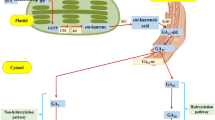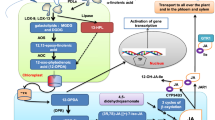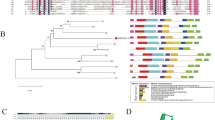Abstract
Main conclusion
Overexpression of the rice gene, OsFes1A, increased phytosterol content and drought and salt stress tolerance in Arabidopsis.
Abstract
Phytosterols are key components of the phospholipid bilayer membrane and regulate various processes of plant growth and response to biotic and abiotic stresses. In this study, it was demonstrated that the overexpression of OsFes1A (Hsp70 nucleotide exchange factor Fes1) increased phytosterols content and enhanced tolerance to salt and drought stress in Arabidopsis. In transgenic plants, the average content of campesterol was 17.6% higher than that of WT, and the average content of β-sitosterol reached 923.75 μg/g, with an increase of 1.33-fold. In fes1a seeds, the contents of campesterol and β-sitosterol reduced by 20% and 10.93%, respectively. In OsFes1A transgenic seeds, the contents of campesterol and β-sitosterol increased by 1.38-fold and 1.25-fold respectively. Furthermore, the germination rate of transgenic Arabidopsis was significantly higher than WT under stress (salt, ABA, and drought treatment). Under salt stress, transgenic plants accumulated a lower MDA content, higher chlorophyll content, and POD activity relative to the wild type, while the mutants showed the opposite pattern Our study found multiple other functions of OsFes1A beyond the defined role of Fes1 in regulating Hsp70, contributing to the better understanding of the essential roles of Fes1 in plants. Meanwhile, it provides the theoretical basis for developing high phytosterol crop varieties.








Similar content being viewed by others
Data availability
No data was used for the research described in the article.
Abbreviations
- ABA:
-
Cis-Abscisic acid
- ADP:
-
Adenosine 5ʹ-diphosphate
- ATP:
-
Adenosine 5ʹ-triphosphate
- BR:
-
Brassinosteroid
- GC–MS:
-
Gas chromatography-mass spectrum
- MDA:
-
Malondialdehyde
- POD:
-
Peroxidase
- qRT-PCR:
-
Quantitative real-time PCR
- WT:
-
Wild type
References
Ahanger MA, Tomar NS, Tittal M, Argal S, Agarwal RM (2017) Plant growth under water/salt stress: ROS production; antioxidants and significance of added potassium under such conditions. Physiol Mol Biol Plants 23(4):731–744. https://doi.org/10.1007/s12298-017-0462-7
Ali I, Sher H, Ali A, Hussain S, Ullah Z (2022) Simplified floral dip transformation method of Arabidopsis thaliana. J Microbiol Meth 197:106492. https://doi.org/10.1016/j.mimet.2022.106492
Bajguz A, Orczyk W, Gołębiewska A, Chmur M, Piotrowska-Niczyporuk A (2019) Occurrence of brassinosteroids and influence of 24-epibrassinolide with brassinazole on their content in the leaves and roots of Hordeum vulgare L. cv. golden promise. Planta 249(1):123–137. https://doi.org/10.1007/s00425-018-03081-3
Benveniste P (2004) Biosynthesis and accumulation of sterols. Annu Rev Plant Biol 55(1):429–457. https://doi.org/10.1146/annurev.arplant.55.031903.141616
Cervilla LM, Blasco B, Ríos JJ, Romero L, Ruiz JM (2007) Oxidative stress and antioxidants in tomato (Solanum lycopersicum) plants subjected to boron toxicity. Ann Bot 100(4):747–756. https://doi.org/10.1093/aob/mcm156
Chang M, Xu Y, Li X, Shi F, Liu R, Jin Q, Wang X (2020) Effects of stigmasterol on the thermal stability of soybean oil during heating. Eur Food Res Technol 246(9):1755–1763. https://doi.org/10.1007/s00217-020-03528-6
Clouse SD, Sasse JM (1998) Brassinosteroids: essential regulators of plant growth and development. Annu Rev Plant Physiol Plant Mol Biol 49(1):427–451. https://doi.org/10.1146/annurev.arplant.49.1.427
Demel RA, De Kruyff B (1976) The function of sterols in membranes. Biochim Biophys Acta Biomembr 457(2):109–132. https://doi.org/10.1016/0304-4157(76)90008-3
Divi UK, Krishna P (2009) Brassinosteroid: a biotechnological target for enhancing crop yield and stress tolerance. New Biotechnol 26(3):131–136. https://doi.org/10.1016/j.nbt.2009.07.006
Dragovic Z, Shomura Y, Tzvetkov N, Hartl FU, Bracher A (2006) Fes1p acts as a nucleotide exchange factor for the ribosome-associated molecular chaperone Ssb1p. Biol Chem 387(12):1593–1600. https://doi.org/10.1515/BC.2006.198
Feng S, Wang L, Shao P, Lu B, Chen Y, Sun P (2022) Simultaneous analysis of free phytosterols and phytosterol glycosides in rice bran by SPE/GC–MS. Food Chem 387:132742. https://doi.org/10.1016/j.foodchem.2022.132742
Fu C, Liu X, Li X, Huo P, Ge J, Hou Y, Yang W, Zhang J, Zhang L, Zhao D, Ma C, Liu J (2020) BRF negatively regulates thermotolerance defect of fes1a in Arabidopsis. Front Plant Sci 11:171. https://doi.org/10.3389/fpls.2020.00171
Gasteiger E, Gattiker A, Hoogland C, Ivanyi I, Appel RD, Bairoch A (2003) ExPASy: the proteomics server for in-depth protein knowledge and analysis. Nucleic Acids Res 31(13):3784–3788. https://doi.org/10.1093/nar/gkg563
Gowda NKC, Kandasamy G, Froehlich MS, Dohmen RJ, Andréasson C (2013) Hsp70 nucleotide exchange factor Fes1 is essential for ubiquitin-dependent degradation of misfolded cytosolic proteins. PNAS 110(15):5975–5980. https://doi.org/10.1073/pnas.1216778110
Gowda NKC, Kaimal JM, Masser AE, Kang W, Friedländer MR, Andréasson C (2016) Cytosolic splice isoform of Hsp70 nucleotide exchange factor Fes1 is required for the degradation of misfolded proteins in yeast. Mol Biol Cell 27(8):1210–1219. https://doi.org/10.1091/mbc.E15-10-0697
Gowda NKC, Kaimal JM, Kityk R, Daniel C, Liebau J, Öhman M, Mayer MP, Andréasson C (2018) Nucleotide exchange factors Fes1 and HspBP1 mimic substrate to release misfolded proteins from Hsp70. Nat Struct Mol Biol 25(1):83–89. https://doi.org/10.1038/s41594-017-0008-2
Hand MJ, Taffouo VD, Nouck AE, Nyemene KPJ, Tonfack B, Meguekam TL, Youmbi E (2017) Effects of salt stress on plant growth, nutrient partitioning, chlorophyll content, leaf relative water content, accumulation of osmolytes and antioxidant compounds in pepper (Capsicum annuum L.) cultivars. Not Bot Horti Agrobo 45(2):481–490. https://doi.org/10.15835/nbha45210928
Harker M, Hellyer A, Clayton JC, Duvoix A, Lanot A, Safford R (2003) Co-ordinate regulation of sterol biosynthesis enzyme activity during accumulation of sterols in developing rape and tobacco seed. Planta 216(4):707–715. https://doi.org/10.1007/s00425-002-0913-3
Harrabi S, St-Amand A, Sakouhi F, Sebei K, Kallel H, Mayer PM, Boukhchina S (2008) Phytostanols and phytosterols distributions in corn kernel. Food Chem 111(1):115–120. https://doi.org/10.1016/j.foodchem.2008.03.044
He F, Chen S, Ning Y, Wang G-L (2016) Rice (Oryza sativa) protoplast isolation and its application for transient expression analysis. Curr Protoc Plant Biol 1(2):373–383. https://doi.org/10.1002/cppb.20026
Hussein H-AA, Alshammari SO, Elkady FM, Ramadan AA, Kenawy SKM, Abdelkawy AM (2022) Radio-protective effects of stigmasterol on wheat (Triticum aestivum L.) plants. Antioxidants 11(6):1144. https://doi.org/10.3390/antiox11061144
Islam MA, Jeong B-G, Jung J, Shin E-C, Choi S-G, Chun J (2017) Phytosterol determination and method validation for selected nuts and seeds. Food Anal Method 10(10):3225–3234. https://doi.org/10.1007/s12161-017-0877-3
Kabani M, Beckerich J-M, Brodsky JL (2002) Nucleotide exchange factor for the yeast hsp70 molecular chaperone Ssa1p. Mol Cell Biol 22(13):4677–4689. https://doi.org/10.1128/MCB.22.13.4677-4689.2002
Katan MB, Grundy SM, Jones P, Law M, Miettinen T, Paoletti R (2003) Efficacy and safety of plant stanols and sterols in the management of bloodcholesterol levels. Mayo Clin Proc 78(8):965–978. https://doi.org/10.4065/78.8.965
Kibria MG, Hossain M, Murata Y, Hoque MA (2017) Antioxidant defense mechanisms of salinity tolerance in rice genotypes. Rice Sci 24(3):155–162. https://doi.org/10.1016/j.rsci.2017.05.001
Kumar S, Masison DC (2019) Hsp70-nucleotide exchange factor (NEF) Fes1 has non-NEF roles in degradation of gluconeogenic enzymes and cell wall integrity. PLoS Genet 15(6):e1008219. https://doi.org/10.1371/journal.pgen.1008219
Kumar MSS, Ali K, Dahuja A, Tyagi A (2015) Role of phytosterols in drought stress tolerance in rice. Plant Physiol Biochem 96:83–89. https://doi.org/10.1016/j.plaphy.2015.07.014
Kumar S, Stecher G, Tamura K (2016) MEGA7: molecular evolutionary genetics analysis version 7.0 for bigger datasets. Mol Biol Evol 33(7):1870–1874. https://doi.org/10.1093/molbev/msw054
Kumar MSS, Mawlong I, Ali K, Tyagi A (2018) Regulation of phytosterol biosynthetic pathway during drought stress in rice. Plant Physiol Biochem 129:11–20. https://doi.org/10.1016/j.plaphy.2018.05.019
Lescot M, Déhais P, Thijs G, Marchal K, Moreau Y, Van de Peer Y, Rouzé P, Rombauts S (2002) PlantCARE, a database of plant cis-acting regulatory elements and a portal to tools for in silico analysis of promoter sequences. Nucleic Acids Res 30(1):325–327. https://doi.org/10.1093/nar/30.1.325
Lindsey K, Pullen ML, Topping JF (2003) Importance of plant sterols in pattern formation and hormone signalling. Trends Plant Sci 8(11):521–525. https://doi.org/10.1016/j.tplants.2003.09.012
Livak KJ, Schmittgen TD (2001) Analysis of relative gene expression data using real-time quantitative PCR and the 2−ΔΔCT method. Methods 25(4):402–408. https://doi.org/10.1006/meth.2001.1262
Merah O, Langlade N, Alignan M, Roche J, Pouilly N, Lippi Y, Vear F, Cerny M, Bouniols A, Mouloungui Z, Vincourt P (2012) Genetic analysis of phytosterol content in sunflower seeds. Theor Appl Genet 125(8):1589–1601. https://doi.org/10.1007/s00122-012-1937-0
Miller G, Suzuki N, Ciftci-Yilmaz S, Mittler R (2010) Reactive oxygen species homeostasis and signalling during drought and salinity stresses. Plant Cell Environ 33(4):453–467. https://doi.org/10.1111/j.1365-3040.2009.02041.x
Nounjan N, Mahakham W, Siangliw JL, Toojinda T, Theerakulpisut P (2020) Chlorophyll retention and high photosynthetic performance contribute to salinity tolerance in rice carrying drought tolerance quantitative trait loci (QTLs). Agriculture 10(12):620. https://doi.org/10.3390/agriculture10120620
Ostlund REJ (2004) Phytosterols and cholesterol metabolism. Curr Opin Lipidol 15(1):37–41. https://doi.org/10.1097/00041433-200402000-00008
Piironen V, Lindsay DG, Miettinen TA, Toivo J, Lampi AM (2000) Plant sterols: biosynthesis, biological function and their importance to human nutrition. J Sci Food Agric 80(7):939–966. https://doi.org/10.1002/(sici)1097-0010(20000515)80:7%3c939::aid-jsfa644%3e3.0.co;2-c
Qian D, Xiong S, Li M, Tian L, Qing QuL (2021) OsFes1C, a potential nucleotide exchange factor for OsBiP1, is involved in the ER and salt stress responses. Plant Physiol 187(1):396–408. https://doi.org/10.1093/plphys/kiab263
Ramprasath VR, Awad AB (2019) Role of phytosterols in cancer prevention and treatment. J AOAC Int 98(3):735–738. https://doi.org/10.5740/jaoacint.SGERamprasath
Šesták Z (1985) Briggs, W. R., Jones, R. L., Walbot, V. (ed.): annual review of plant physiology. Biol Plant 27(2):220–220. https://doi.org/10.1007/BF02902164
Shahzad N, Khan W, Md S, Ali A, Saluja SS, Sharma S, Al-Allaf FA, Abduljaleel Z, Ibrahim IAA, Abdel-Wahab AF, Afify MA, Al-Ghamdi SS (2017) Phytosterols as a natural anticancer agent: current status and future perspective. Biomed Pharmacother 88:786–794. https://doi.org/10.1016/j.biopha.2017.01.068
Shahzad R, Ewas M, Harlina PW, Khan SU, Zhenyuan P, Nie X, Nishawy E (2021) β-Sitosterol differentially regulates key metabolites for growth improvement and stress tolerance in rice plants during prolonged UV-B stress. J Genet Eng Biotechnol 19(1):79. https://doi.org/10.1186/s43141-021-00183-6
Shomura Y, Dragovic Z, Chang H-C, Tzvetkov N, Young JC, Brodsky JL, Guerriero V, Hartl FU, Bracher A (2005) Regulation of Hsp70 function by HspBP1: structural analysis reveals an alternate mechanism for Hsp70 nucleotide exchange. Mol Cell 17(3):367–379. https://doi.org/10.1016/j.molcel.2004.12.023
Sparkes IA, Runions J, Kearns A, Hawes C (2006) Rapid, transient expression of fluorescent fusion proteins in tobacco plants and generation of stably transformed plants. Nat Protoc 1(4):2019–2025. https://doi.org/10.1038/nprot.2006.286
Xia X-J, Wang Y-J, Zhou Y-H, Tao Y, Mao W-H, Shi K, Asami T, Chen Z, Yu J-Q (2009) Reactive oxygen species are involved in brassinosteroid-induced stress tolerance in cucumber. Plant Physiol 150(2):801–814. https://doi.org/10.1104/pp.109.138230
Xu M, Wang Y, Zhang M, Chen M, Ni Y, Xu X, Xu S, Li Y, Zhang X (2023) Genome-wide identification of BES1 gene family in six Cucurbitaceae species and its expression analysis in Cucurbita moschata. Int J Mol Sci 24(3):2287. https://doi.org/10.3390/ijms24032287
Zhang J-X, Wang C, Yang C-Y, Wang J-Y, Chen L, Bao X-M, Zhao Y-X, Zhang H, Liu J (2010) The role of arabidopsis AtFes1A in cytosolic Hsp70 stability and abiotic stress tolerance. Plant J 62(4):539–548. https://doi.org/10.1111/j.1365-313X.2010.04173.x
Zhang C, Ma W, Xu M, Li T, Han G, Gu L, Chen M, Zhang M, Cheng B, Zhang X (2023) Identification and functional characterization of ZmSCYL2 involved in phytosterol accumulation in plants. Int J Mol Sci 24(12):10411. https://doi.org/10.3390/ijms241210411
Funding
This work was supported by the Anhui Provincial Natural Science Foundation (2308085MC73).
Author information
Authors and Affiliations
Contributions
MX conducted experiments and wrote the draft. MZ and YT raised of plants. MX and XZ reviewed and edited this article. All authors read and approved the final version of the manuscript. The authors declare no conflict of interest.
Corresponding author
Ethics declarations
Conflict of interest
The authors declare that they have no competing interests.
Additional information
Communicated by De-Yu Xie.
Publisher's Note
Springer Nature remains neutral with regard to jurisdictional claims in published maps and institutional affiliations.
Supplementary Information
Below is the link to the electronic supplementary material.
Rights and permissions
Springer Nature or its licensor (e.g. a society or other partner) holds exclusive rights to this article under a publishing agreement with the author(s) or other rightsholder(s); author self-archiving of the accepted manuscript version of this article is solely governed by the terms of such publishing agreement and applicable law.
About this article
Cite this article
Xu, M., Zhang, M., Tu, Y. et al. Overexpression of the OsFes1A increased the phytosterols content and enhanced drought and salt stress tolerance in Arabidopsis. Planta 259, 63 (2024). https://doi.org/10.1007/s00425-024-04346-w
Received:
Accepted:
Published:
DOI: https://doi.org/10.1007/s00425-024-04346-w




